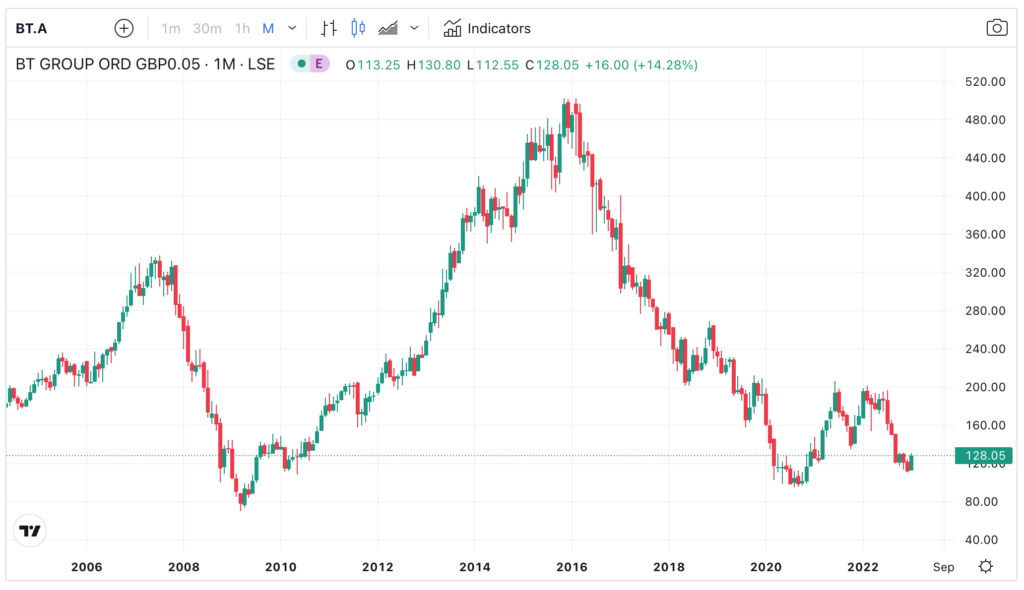Over the past 12 years, BT Group shareholders had to endure a boom-bust cycle akin to a speculative dotcom stock. From a low of 80p, the stock soared 6x to a high of 480p-500p in 2015. Then, the stock collapsed 80 percent to 100p (see below). It was not the magnitude of the drop that astounded investors but the length too. Five years of persistent price decline.
While a rebound during the 2021 bull market raised hopes a new bull market in the stock, that rally petered out at 200p. Prices are now 35 percent below its 12-month peak.
Of course, readers will point out a similar trend in Centrica (CNA), where prices slumped by 90% from 400p, along with free-falling BT shares. Their collective price action highlights the immense risk in holding UK utility stocks ‘for the long term’.

However, after a prolonged bear market, should we be looking at buying BT shares again?
Naturally, investors are wary of the BT shares after a such a roller-coaster ride for these reasons:
- Investors are concerned about the large £19 billion debt pile sitting on the company’s balance sheet. Is the company profitable enough to deal with this? The answer is not all that clear. Revenue growth is static; so is BT’s profit margin.
- The BT pension deficit is another negative point. It is worth mentioning that BT’s pension is the largest in the country. As interest rates rise rapidly, the scheme is creaking under pressure. Last October, BT Pension Scheme reportedly lost £11 billion due to the ‘Mini Budget’. As one market commentator quipped: “BT is like a badly-run hedge fund which just happens to own a phone network.”
And did you know this: The size of BT Pension Scheme (£40-50bn) is actually three times larger than BT’s market cap of £12.7 billion? In all, BT appears to be a legacy business with plenty of financial and operational constraints on its business.
But its low share price is attracting predators, like the billionaire Patrick Drahi who bought up to 18 percent of BT in 2021. A hostile takeover is unlikely given the critical position of BT in the country’s telecom network. Still, it tells us there is some equity value embedded in the BT Group.
If any investor were to start with a clean slate, BT Group could be a candidate stock to buy – for its yield and the possibility of an oversold rebound. But I wouldn’t overweight the stock too much in any equity portfolio unless its share price stabilises and start to outperform.

Jackson is a core part of the editorial team at GoodMoneyGuide.com.
With over 15 years industry experience as a financial analyst, he brings a wealth of knowledge and expertise to our content and readers.
Previously Jackson was the director of Stockcube Research as Head of Investors Intelligence. This pivotal role involved providing market timing advice and research to some of the world’s largest institutions and hedge funds.
Jackson brings a huge amount of expertise in areas as diverse as global macroeconomic investment strategy, statistical backtesting, asset allocation, and cross-asset research.
Jackson has a PhD in Finance from Durham University and has authored nearly 200 articles for GoodMoneyGuide.com.

